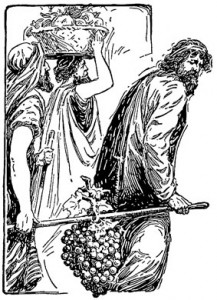John Piper & Doug Wilson on the same page

John Piper explains why he invited Doug Wilson to speak at DG’s Fall conference, here.

John Piper explains why he invited Doug Wilson to speak at DG’s Fall conference, here.
“Some things need to be nuanced, and some things need desperately not to be. Those with a sophisticated turn of mind need to talk to an intractable fundamentalist once a week or so — to keep them honest. ‘So how is this not fatal compromise?’ And fundamentalists need to talk regularly with someone who read a book once — to keep them honest too. ‘So how is this not a complete misrepresentation of Calvin’s view?’”
–Doug Wilson, A Vat of Heideggerian Goo
For a blast and a laugh, read all Doug’s penetrating and perceptive posts on postmodernism.
“…Another example of [the state] straining towards the divine attributes can be seen in the recent attempts by Obama through the U.S. Treasury to create wealth ex nihilo. But only God can create wealth that way. God spoke the word, and mind-boggling resources were instantly there. And God formed our first parents, and gave them the responsibility for stewarding those resources. That is the authority of the divine — He speaks, and it is. And blinkered statists want to be able to do that. They should be able to speak, and it is “there.” And so they speak, and what was there begins to vanish away. Jezebel brings in the fertility Baal to make Israel lush and green, and the first thing that happens is that Israel turns brown and crispy.”
Douglas Wilson, The Jitney Gods of Washington
Doug Wilson on Craig Blomberg’s review of N. T. Wright’s book-length response to John Piper’s book (breath):
“Then there is Blomberg’s misunderstanding of the relationship of the Reformers and culture.
‘Fixate on the Reformers’ (understandable) preoccupation with how an individual becomes right with God (crucial in its day against medieval Catholicism) and one may miss the bigger picture, in which the fulfillment of God’s covenant with Abraham through the children of Israel as progenitor of the Messiah looms even larger.’
Notice what is being juxtaposed here. The Reformers had an individualistic fixation on getting individuals into heaven when they die. But we, upon whom the new perspective has shone, now understand that there is a “bigger picture.” I see. And what did the Reformers do with their narrow vision? Well, they toppled kings, transformed laws, overhauled cultures, settled a continent, built nations, founded schools and colleges, inspired musicians and painters, and we could continue in this vein for quite a while. And what do we do, entranced as we are by the new perspective? We write academic papers, download podcasts of academic lectures that we can listen to in the privacy of our ear buds, and we go white in the face if conservative Christians suggest that Jesus might have an opinion about the ongoing slaughter of the unborn. John Piper, with his preaching on the pro-life issue, challenges the principalities and powers. The soft statism that goes with trendy theology these days does nothing of the kind — it simply suggests (but not too loudly) that we need kinder, gentler principalities and powers.”
High Chair Fundamentalism
The author of Hebrews wants to press on beyond basic Christian doctrine. He does not want to abandon this foundation, but he does want to build on it. That foundation is repentance from religion, faith in God, the meaning of the Levitical washings or baptisms in the Law, the laying on of hands, the resurrection, and eternal judgment. He is not content with his readers remaining in an infantile state–he intends to press on.
This is important because remaining in the foundational doctrines without pressing on creates the temptation toward apostasy. Those who have been initiated, who have tasted, but who do not press on to know Christ further are in grave danger. Sticking with the basics only is therefore not a good way to stick to the basics.
This is the central problem with pietistic fundamentalism; at the end of the day it is counterproductive and does not defend the things it seeks to defend. The real way to “defend” a foundation is by building on it.
–Doug Wilson, Christ and His Rivals, p. 111
Always a Good Investment
Our nation is in the midst of significant financial upheaval, along with many other nations, and because of this we have to remember certain things as we approach God with our worship. Lord willing, we will address this in greater detail in next week’s message, but it is important to say a few things about it now.
“The kingdom of God is like a banquet filled up with blind and lame losers. We must replicate that in our lives, loving the unlovely. And the kingdom of God is also like a banquet where the servants drag out a guy in blue jeans so that he could be handed over to the torturers. Huh. The Lord’s Table is a come-one, come-all event. The Lord’s Table is place of fierce discipline. Absolutise either one, and trouble ensues.”
Over the years we have emphasized the importance of ritual. Rituals are significant in the Bible, and they ought to be significant to us. We have also emphasized the importance of worshipping God with our bodies and not just with our minds. We have sought to resist the temptation that many Reformed Christians deal with, which is the idea that God gave us bodies as carrying cases to get our brains to church.
“How is the land, is it fat or lean? Are there trees in it or not? Make an effort then to get some of the fruit of the land.” Now the time was the time of the first ripe grapes… Then they came to the valley of Eshcol and from there cut down a branch with a single cluster of grapes; and they carried it on a pole between two men. (from Numbers 13)
But Christ has indeed been raised from the dead, the firstfruits of those who have fallen asleep. (1 Corinthians 15:20)
 The Tabernacle is an architectural model of the world. Each of the seven speeches of the Lord (Exodus 25-31) is introduced with a variant of the phrase “Then Yahweh spoke to Moses, saying.” The seven speeches follow the pattern of the seven days of the Creation week, and also the seven feasts in Leviticus 23.
The Tabernacle is an architectural model of the world. Each of the seven speeches of the Lord (Exodus 25-31) is introduced with a variant of the phrase “Then Yahweh spoke to Moses, saying.” The seven speeches follow the pattern of the seven days of the Creation week, and also the seven feasts in Leviticus 23.
The Table of Showbread corresponds to both the grain and fruit created on Day 3, the Feast of Firstfruits and to the Asension of Moses.
This pattern began in the garden, when after Adam’s “Red Sea” death and resurrection, he was united to his bride by Covenant. He “ascended” as covenant head of a new family, with God’s one Law.
On the table in the Holy Place were twelve loaves of bread and jugs of beer (from grain), and later, wine. Like the manna and the grapes of Eshcol, these were a promise of rest and rule with God on a future Sabbath as priest and king. Here is the last supper. As with Adam and Moses, this initial promise of wine was followed by exposure to the serpent for testing under the Law – Pentecost.
Just as the marriage covenant of Adam and Eve at Firstfruits is really a betrothal of their united marriage to God on Day 7, so this Table of Israel was a promise of future glory to the whole world at the final Sabbath feast, Tabernacles.
To use Doug Wilson’s phrase, human marriage is “manifest glory.” It is a Day 3 picture of the Day 7 rest to come at the union of heaven and earth.
Samson is often presented as a moose.
 A commonly held opinion is that Samson was stupid. However, his earlier acts were inspired by the influence of the Spirit, carefully calculated, spectacularly executed and achieved the desired results.
A commonly held opinion is that Samson was stupid. However, his earlier acts were inspired by the influence of the Spirit, carefully calculated, spectacularly executed and achieved the desired results.
For instance, Samson only told his wife the answer to his riddle so he would know where the leak came from when she was tested.
This reminded me of the test for harlotry in Numbers 5. The priest administers the bitter word to the woman, and if she passes the test, she will be a fruitful blessing.
Samson’s wife failed the test, and the outcome was a bit like that after the harlotry with the golden calf, with Samson as the slaughtering Levite.
Speaking of which, Numbers 5 comes right before Numbers 6 — the Nazirite vow. Men who took this vow became, basically, warrior brides. Their uncut hair was a sign of submission. Revelation draws on this imagery to describe the apostles and first century saints as virgins.
So Samson’s wife betrayed him, and Samson betrayed his own covenant ‘husband,’ the Lord.
Doug Wilson points out (somewhere) that biblical relationships are more complex than those of Islam. In Islam, the line of authority is linear, the natural outcome of a simple god of power. Might is right, from top to bottom. With Christianity, the submission of the members of the Trinity within the Godhead overflows into family and society, with the members submitting to one another, and constantly bestowing good upon one another.
So Samson can be both a bride and a bridegroom. Facing heaven, a minister is part of the bride. Facing his church, he images the bridegroom.